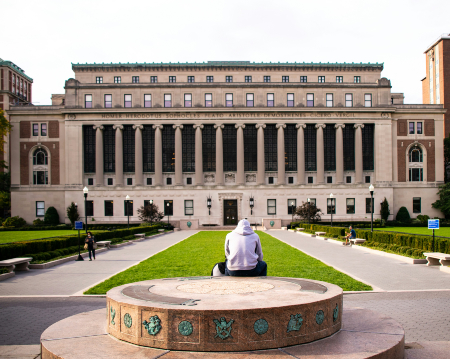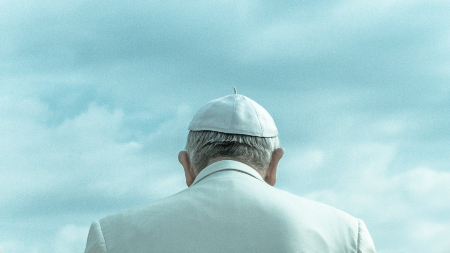 Hi readers, it seems you use Catholic Online a lot; that's great! It's a little awkward to ask, but we need your help. If you have already donated, we sincerely thank you. We're not salespeople, but we depend on donations averaging $14.76 and fewer than 1% of readers give. If you donate just $5.00, the price of your coffee, Catholic Online School could keep thriving. Thank you. Help Now >
Hi readers, it seems you use Catholic Online a lot; that's great! It's a little awkward to ask, but we need your help. If you have already donated, we sincerely thank you. We're not salespeople, but we depend on donations averaging $14.76 and fewer than 1% of readers give. If you donate just $5.00, the price of your coffee, Catholic Online School could keep thriving. Thank you. Help Now >
Six Words That Bring Comfort in Confusing Times
FREE Catholic Classes
In one of my many encounters with Justice Clarence Thomas, a great hero of our times and a matchless defender of the Constitution, he was answering a question about how we interpret our Founding documents.
 Hi readers, it seems you use Catholic Online a lot; that's great! It's a little awkward to ask, but we need your help. If you have already donated, we sincerely thank you. We're not salespeople, but we depend on donations averaging $14.76 and fewer than 1% of readers give. If you donate just $5.00, the price of your coffee, Catholic Online School could keep thriving. Thank you. Help Now >
Hi readers, it seems you use Catholic Online a lot; that's great! It's a little awkward to ask, but we need your help. If you have already donated, we sincerely thank you. We're not salespeople, but we depend on donations averaging $14.76 and fewer than 1% of readers give. If you donate just $5.00, the price of your coffee, Catholic Online School could keep thriving. Thank you. Help Now >

Photo credit: Rod Long
Highlights
7/29/2023 (9 months ago)
Published in Living Faith
Keywords: Pro-Life Leader, Frank Pavone, six, words, Clarence, Thomas
"Just read them," he said, and went on to explain that their texts have an understandable meaning which we must respect.
It reminded me of what I've told students in the many Bible courses I've taught: Scripture study begins with reading the Scriptures themselves!
Justice Thomas then went on to say that judges are inclined to invent obscure and novel terms at various stages of history and in various written opinions that they issue. Some are older and more widespread than others.Â
Think, for instance, of "substantive due process," which has to do with "rights" that are not mentioned in the Constitution. The fake "right to abortion" found haven here for a long time.
Or "undue burden," given to us in the Planned Parenthood vs. Casey decision as a confusing guideline to what restrictions on abortion would be considered constitutional.
The problem, Justice Thomas explained, is that these terms do not define themselves, have interpretations that even the judges who invented them disagree about, and lend themselves to just being a cover for whatever policy positions a majority of the Court may want to impose at a given point in time.
Never mind the will of the people or the original intent of those who wrote the Constitution or the laws under consideration.
This was wise insight from Justice Thomas.
And we would be wise to consider how it applies within the Church.
We are currently hearing a lot about the "Synod on Synodality." How many practicing Catholics, prior to the recent introduction of this term, had ever heard such language? And how many of them would be able to explain it now? And if you listed all those explanations or definitions, how wide of a diversity of opinions would you find?
That's the danger. And it's an unnecessary danger.
I'm not saying that Synods don't have their place.Â
But God has spoken His Word for all the world to hear and to read. The Catechism has been issued for all the faithful to read. We do not believe in a Church that has a special elite group of members who have more of the Bible or more of the Catechism than the rest of us do.
Like our Constitution, the authors intended for these treasures to be read and understood by all, and then to be handed on to our children and our children's children.But now we have terms being introduced and widely used at the highest levels of the Church. Their meaning is far from self-evident, and these terms lack the value of a common, shared understanding passed along over the centuries.
I do not mean to attribute ill will to anyone. But the fact is that this scenario opens the possibility for individuals and groups to read into these terms whatever meaning they want, or whatever "policy preference," they have, perhaps "discovering" rights or teachings that we had not heard of before.
It's a time of great confusion in the Church. People hear their pastors, their bishops, and even their Pope saying things that sound unfamiliar.
We believe in the "sensus fidelium." The Holy Spirit keeps the Church faithful to the teachings of Christ as that Spirit is poured out on every one of the baptized faithful. We study and live the Faith; we make sacrifices each day to observe the faith and avoid what contradicts it. And this gives us the ability to recognize it.Â
We know the Faith when we hear it, and we know what diverges from the Faith when we hear it.
That doesn't mean that everyone has a command of the theologically specific language to discern every nuance of thought. But it does mean that we as a Body do pretty well at staying on the straight and narrow, and if necessary, providing an ecclesiastical equivalent of the "checks and balances" we have under our Constitution to keep us from departing from a proper understanding of what has been handed on to us.
So in the midst of all the confusion that reigns today, and especially as we come closer to the "Synod on Synodality," the explanations of which tend to be more obscure thanÂ
the title, I offer this advice:
It's OK to be confused about what a particular pastor, bishop, or even Pope might say. But there's no need to be confused about what the Faith says. Amidst all the confusing language and concepts of our day, we need to keep our minds and hearts focused on these six simple words: What the Church has always taught.
That's it.Â
And that's quite enough.
Follow Pro-life Leader Frank Pavone on social media @frfrankpavone and in his daily broadcasts on www.EndAbortion.TV.Â
Join the Movement
When you sign up below, you don't just join an email list - you're joining an entire movement for Free world class Catholic education.
-

-
Mysteries of the Rosary
-
St. Faustina Kowalska
-
Litany of the Blessed Virgin Mary
-
Saint of the Day for Wednesday, Oct 4th, 2023
-
Popular Saints
-
St. Francis of Assisi
-
Bible
-
Female / Women Saints
-
7 Morning Prayers you need to get your day started with God
-
Litany of the Blessed Virgin Mary
Chaplain Reveals Unrest at Columbia University Caused by Communists
-

Discovering Who We Are: God's Truth in Scripture
-

Pope Francis Advises Parish Priests on Fostering a Missionary Church
-
5 Reasons Going To Church Is Important (even on days you feel like you can skip)
-
U.S. Catholic Parishes Experience Resurgence of Traditional Practices
Daily Catholic
 Daily Readings for Saturday, May 04, 2024
Daily Readings for Saturday, May 04, 2024 St. Florian: Saint of the Day for Saturday, May 04, 2024
St. Florian: Saint of the Day for Saturday, May 04, 2024 The Universal Prayer (attributed to Pope Clement Xi): Prayer of the Day for Saturday, May 04, 2024
The Universal Prayer (attributed to Pope Clement Xi): Prayer of the Day for Saturday, May 04, 2024- Daily Readings for Friday, May 03, 2024
- St. James the Lesser: Saint of the Day for Friday, May 03, 2024
- Prayer before Starting on a Journey: Prayer of the Day for Friday, May 03, 2024
We ask you, humbly: don't scroll away.
Hi readers, it seems you use Catholic Online a lot; that's great! It's a little awkward to ask, but we need your help. If you have already donated, we sincerely thank you. We're not salespeople, but we depend on donations averaging $14.76 and fewer than 1% of readers give. If you donate just $5.00, the price of your coffee, Catholic Online School could keep thriving. Thank you.Help Now >
![]()
Copyright 2024 Catholic Online. All materials contained on this site, whether written, audible or visual are the exclusive property of Catholic Online and are protected under U.S. and International copyright laws, © Copyright 2024 Catholic Online. Any unauthorized use, without prior written consent of Catholic Online is strictly forbidden and prohibited.
Catholic Online is a Project of Your Catholic Voice Foundation, a Not-for-Profit Corporation. Your Catholic Voice Foundation has been granted a recognition of tax exemption under Section 501(c)(3) of the Internal Revenue Code. Federal Tax Identification Number: 81-0596847. Your gift is tax-deductible as allowed by law.








 Daily Readings for Saturday, May 04, 2024
Daily Readings for Saturday, May 04, 2024 St. Florian: Saint of the Day for Saturday, May 04, 2024
St. Florian: Saint of the Day for Saturday, May 04, 2024 The Universal Prayer (attributed to Pope Clement Xi): Prayer of the Day for Saturday, May 04, 2024
The Universal Prayer (attributed to Pope Clement Xi): Prayer of the Day for Saturday, May 04, 2024
